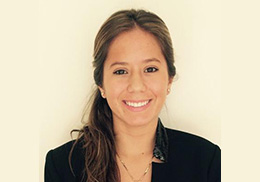
21 september 2017
- Why did you chose this Master’s Degree?
My whole life I have been interested in perinatal care and childhood, however, the Master’s Degrees that I have searched for both the United States and Spain do not only include the age range of childhood, there were more of those who were “child-teenager" and it seemed to me that they covered too much and did not focus on what I really wanted to focus. On the other hand the majority of Master’s Degrees in Europe were of only 1 year what seemed to me little for a specialty of mental health. In the United States on the other hand, they were masters of at least 2 years up to 4 years, however, they were very general as "mental health", “Master’s Degree in adolescent psychology" but not with an innovative approach in psychology and health mental. That’s why the Master’s Degree convinced me when I saw the topics and the teaching staff. You can not find this Master’s Degree in other countries. For that reason I travelled from South America to study it, since it included branches of psychology and more in particular for its focus on perinatal care which is something I have not found anywhere else.
- In general terms, how would you rate your experience?
My experience has been very good, different from what I got from my past years. I studied the Degree in the United States and the structure and organisation of the lessons, the subject etc is different so it is a completely new experience. I liked it very much that there was a variety of teachers and specialities.
- What kind of subjects are taught in the Master’s Degree and which contents shall we expect on them?
I really think that the subject of the subjects and the variety of teachers that we have is the strength of the Master’s Degree. We have teachers from all over Europe and even from other continents, with a range of specialties so varied and extensive that is amazing because I really leave this master with knowledge from psychology to gynaecology. And the crucial thing about this knowledge is that I do not receive them through a book if not by the specialists who write the same articles or books; i.e. the quality of foreign teachers of the master is fabulous.
- What can you tell us about the teaching staff and the used training methodology?
As I said, the foreign teaching staff is truly amazing. It is incredible to be able to say that we have had professors who write and have published in prestigious international journals. On the other hand, national professors are very good and all of them offer a great variety of different interventions and experiences. Regarding methodology I can say that from the first module we had real cases to work with, which is crucial for a master’s degree related to mental health. All classes are dynamic, with videos, interventions and group participation, which makes class hours to lighter and strengthens the knowledge and experience learned.
- Are there practical classes? What did you learn in them?
The master’s degree has a requirement of 475 hours of practice at the end of the second year in a wide variety of places in Spain, and throughout all Europe. However, the most part of the practice we do is day-to-day in classes, with the real cases professors bring and show us.
- What approach did you give to your Master’s Degree final project (TFM) and what do you think it provided you with professionally speaking?
I am still in the first year, which is why I have not start working on the final project yet. However I want to do some kind of research or intervention in my country, Ecuador. I am interested in working with the poorest areas of Ecuador and intervening with families who really need to give importance to perinatal care and mental health. Since in high poverty countries their main focus is to eat and live day to day, many people do not even know that a young child may have difficulties in developing or can develop disorders. That is why I would really like to apply research or intervention to underprivileged populations in Ecuador and to evaluate their development and effectiveness. With an investigation of this kind I hope to contribute the master’s degree with knowledge of perinatal care and childhood in less developed countries.
- What are the career opportunities after finishing the Master’s Degree?
When I finish the master's degree I have several professional aspirations that I wish to be able to establish when I return to my country. I would love to work in a hospital or a clinic and apply all the knowledge I have in the field of perinatal care. On the other hand, I am very interested in working with parents and being able to help them with their children and their interactions in the daily life. I am really about working with parents because I have realised that many couples who decide to have children do not really know what it means and what responsibilities they have as parents. For this reason, I believe it is crucial to work with parents in the prevention of disorders and to promote good mental health. Finally, I would love to be able to establish myself in the private practice and work with parents who have doubts or families who need intervention.



















